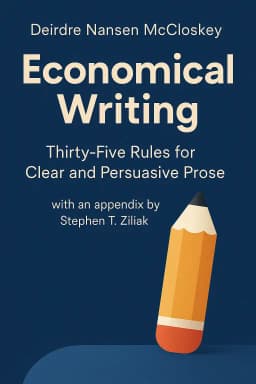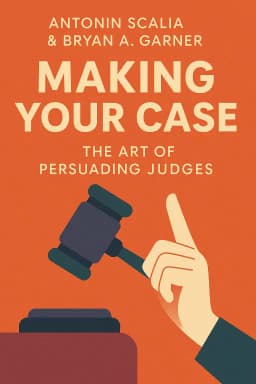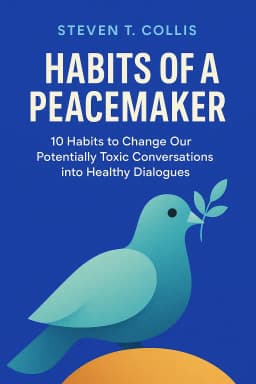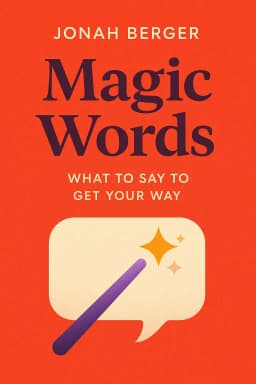
The Human Algorithm
Golden Hook & Introduction
SECTION
Michelle: A recent study found that 94 percent of HR professionals would promote an employee with strong communication skills over one with more experience but weaker verbal skills. Mark: Ninety-four percent? That’s staggering. It completely flips the old career advice on its head. We’re always told to just get more experience, put in the years. But this suggests that how you talk about your work is more important than the work itself. Michelle: It’s a seismic shift. And it’s the central argument in Carmine Gallo's book, Five Stars: The Communication Secrets to Get from Good to Great. He argues that in our modern economy, persuasion isn't a soft skill anymore. It’s fundamental. Mark: And Gallo is the perfect person to make this case. He's not some disconnected academic; he's a former journalist and a high-level communication coach for giants like Google and Apple. He's in the trenches, seeing this play out in the most competitive companies on Earth. Michelle: Exactly. And his core message is that this isn't just about getting a promotion. In the age of AI, mastering human connection is about survival. It's about becoming irreplaceable. Mark: That’s a bold claim. Irreplaceable. I think we need to dig into that.
The Human Edge: Why Your 'Soft' Skills Are Your Hardest Asset in the Age of AI
SECTION
Michelle: Let's start there, because it’s the foundation of the whole book. Gallo tackles the fear of AI head-on. He tells this fantastic story about a competition sponsored by the Hewlett Foundation. They partnered with Kaggle, a community of data scientists, and challenged them to build an AI that could grade student essays as well as a human. Mark: Okay, I can see where this is going. The machine wins, and we all start updating our resumes. Michelle: That's what you'd think! And the AI did perform reasonably well. It could analyze sentence structure, spelling, and punctuation, and it successfully replicated the scores that human graders gave to average essays. Mark: Only the average ones? Michelle: Only the average ones. Where it completely fell apart was with the exceptional essays. The AI failed to recognize creativity, originality, and groundbreaking ideas. It couldn't spot the spark of genius. The most creative essays actually received lower grades than they deserved because they didn't fit the predictable patterns the algorithm was trained on. Mark: Wow. So the AI was a great enforcer of mediocrity, but a terrible judge of excellence. That’s a really powerful distinction. Michelle: It is. And it gets to the heart of Gallo's argument. Machines can process existing data, but they can't generate truly novel ideas or appreciate human creativity. Mark: I have to push back a little here, Michelle. That’s a compelling story, but some critics of Gallo's book say it's a bit anecdote-heavy. They argue he cherry-picks stories that fit his narrative. With AI advancing so rapidly, isn't it possible this "human edge" is just a comforting fantasy we tell ourselves? Michelle: That's a fair challenge, and it's one Gallo anticipates. He provides another, even more striking example. A Japanese mathematician named Noriko Arai built an AI called the "Todai Robot." It was designed to pass the notoriously difficult entrance exam for the University of Tokyo. Mark: And how did it do? Michelle: It was astonishing. The Todai Robot outperformed 80 percent of the high school students taking the exam. It was a master at retrieving facts and combining information from existing sources, which is what most of the exam tests. Mark: But there's a "but" coming, isn't there? Michelle: There's a huge "but." It couldn't beat the top 20 percent. The students who stood out were the ones who could think creatively, who could extrapolate meaning beyond the literal question. The robot could answer questions, but it couldn't think. As one AI expert in the book, Neil Jacobstein, puts it: "Machines can learn to read human emotion, but they don’t have human emotions. It’s a very important distinction." Mark: I see. So the human edge isn't about processing power; it's about creativity, critical thinking, and that emotional layer. I'm convinced on the 'why' we need this. But that brings up the bigger question: how? What does becoming 'more human' actually look like in practice?
Aristotle's Secret Weapon: The Timeless Power of Pathos, Logos, and Ethos
SECTION
Michelle: This is where Gallo dusts off a 2,000-year-old playbook that he says is more relevant now than ever. He argues that the secret to five-star communication lies in Aristotle's three rhetorical proofs: Pathos, Logos, and Ethos. Mark: Hold on, that sounds like my high school debate class. Can you break down what that actually means for someone who isn't trying to win a toga-wearing argument? Michelle: Absolutely. It's simpler than it sounds. Ethos is your credibility—why should anyone listen to you? Logos is your logic—the data, the facts, the structure of your argument. And Pathos is the emotional appeal—the story, the feeling, the connection. Gallo’s big point is that we're obsessed with Logos, with our spreadsheets and data points, but we forget that Pathos is the gateway. Emotion is what makes people care about the logic. Mark: Okay, that makes sense. You need to capture the heart before you can convince the head. Michelle: Precisely. And the perfect example of this in action is John F. Kennedy's moonshot challenge. When JFK declared in 1961 that America would put a man on the moon by the end of the decade, it was an audacious goal. He had to persuade an entire nation. Mark: How did he use the three proofs? Michelle: Well, his Ethos was immense—he was the President of the United States. His Logos was the plan he laid out: he broke the massive goal into smaller, concrete missions like the Mercury and Gemini programs, giving people a logical path to follow. But the real genius was his Pathos. He didn't frame it as a cold, scientific objective. He framed it as a grand adventure, a testament to the human spirit. He spoke of "the new frontier," igniting the nation's imagination. Mark: So Pathos is the 'why we should care,' Logos is the 'here's the plan,' and Ethos is the 'why you should trust me.' JFK wasn't just presenting a technical project; he was selling an epic adventure. He made 400,000 people feel like they were part of something historic. Michelle: Exactly! And what's fascinating is that modern neuroscience now backs this up. The book cites research showing that when we hear a compelling story, our brains release oxytocin—the trust or love molecule. It literally creates a chemical bond between the speaker and the listener. Aristotle knew this intuitively 2,000 years ago, and now we have the fMRI scans to prove it. Mark: That’s incredible. So a great story isn't just a communication tool; it's a neurochemical event. It literally changes the listener's brain. Michelle: It changes everything. And that "epic adventure" feeling isn't just random magic; it's built on a specific structure. It's a blueprint.
The Storyteller's Blueprint: Deconstructing Persuasion into Actionable Formulas
SECTION
Mark: A blueprint? I like the sound of that. It makes it feel less like some innate talent and more like a skill anyone can learn. Michelle: That’s Gallo’s entire point. He argues that the most effective storytelling tool is the classic three-act structure, the same one used in almost every successful Hollywood movie. Act One is the Setup, Act Two is the Conflict, and Act Three is the Resolution. Mark: Give me an example. How does this work in the real world, outside of a movie theater? Michelle: Let's take one of the most famous startup stories of our time: Airbnb. When founders Brian Chesky and Joe Gebbia were pitching for investment, they didn't just show spreadsheets. They told a story. The Setup: They were two broke designers in San Francisco who couldn't make rent. The Conflict: An industrial design conference came to town, and all the hotels were booked. They had a crazy idea to rent out air mattresses on their floor, but they faced constant rejection from investors. They were so desperate for cash they resorted to creating and selling novelty cereal boxes called "Obama O's" and "Cap'n McCains." Mark: They sold cereal? I never knew that part. That's a great detail. It really shows the struggle. Michelle: It's the perfect conflict! It shows their desperation and their creative hustle. And then, the Resolution: They finally get into the Y Combinator accelerator program, refine their idea, and eventually build a global company valued at over $30 billion. That story—the struggle, the cereal, the eventual triumph—is infinitely more persuasive than just a business plan. Mark: That's brilliant. So anyone can use this. If I'm pitching a project at work, the setup is the problem our team is facing. The conflict is the obstacle, the budget cuts, the failed attempts. And the resolution is my proposed solution. It turns a boring proposal into a mini-drama. Michelle: You've got it. It works on any scale. Gallo tells this charming story about a 12-year-old girl named Alexa Cousin who desperately wanted a puppy. Her parents were firmly against it. So, what did she do? She created a PowerPoint presentation using Aristotle's principles. Mark: A 12-year-old made a persuasive pitch deck for a puppy? That’s amazing. Michelle: She did! For Logos, she presented scientific data on how dog ownership reduces stress. For Ethos, she promised to be a responsible owner. And for Pathos, she showed adorable pictures and even had her little sister make an emotional appeal. It was a perfect three-act story: a girl's dream (setup), her parents' opposition (conflict), and her persuasive pitch (resolution). Mark: And did it work? Michelle: Of course it did! They got a Golden Doodle named Tucker. It just goes to show that this blueprint is a fundamental human communication tool. It works for winning over investors, and it works for winning over your parents.
Synthesis & Takeaways
SECTION
Mark: What I'm really taking away from this is that the future of work isn't about becoming more like machines; it's about becoming more profoundly human. The great irony is that technology, the very thing we fear will replace us, is actually forcing us to rediscover these ancient, core skills of connection and persuasion. Michelle: That’s the perfect summary. It's not about out-calculating the algorithm; it's about inspiring the person sitting across from you. It’s about moving them. And that ability to move people, to make them feel something, is what truly creates value. Mark: It’s a hopeful message, really. It suggests our most human qualities are our greatest economic assets. Michelle: It is. And it reminds me of a powerful quote from the book by Jack Ma, the founder of Alibaba. He said that in the future, it won't be about IQ or even EQ. He said, "To be respected, you must have LQ: the love quotient. It’s something machines will never have." Mark: The love quotient. Wow. That’s a five-star thought to end on. Michelle: I agree. And for everyone listening, think about a time a story, not just a list of facts, truly changed your mind about something important. What was it about that narrative that connected with you? We'd love to hear your thoughts and continue the conversation with the Aibrary community. Mark: A great story can change the world. Or at least get you a puppy. Michelle: This is Aibrary, signing off.









